The True Costs of Parrot Ownership: A Comprehensive Guide
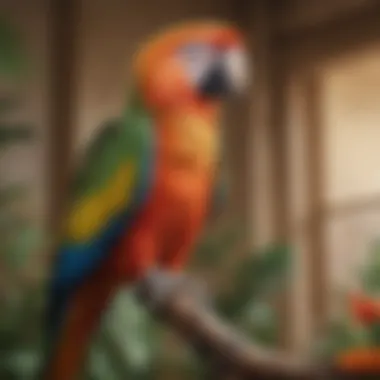
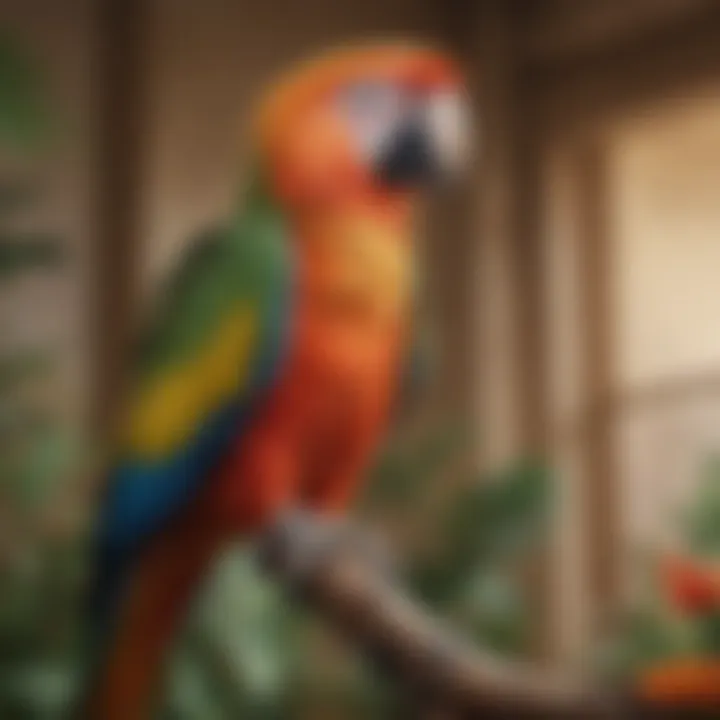
Intro
Understanding the financial implications of parrot ownership is essential for those contemplating the addition of a feathered companion to their lives. While parrots are often celebrated for their beauty and intelligence, potential owners must recognize that this joy comes with significant responsibilities. The purpose of this article is to provide insightful information on the various costs associated with owning a parrot, encapsulating both initial and ongoing expenditures.
This article will closely scrutinize factors that affect the pris of different parrot species, influencing the overall cost of ownership. Elements such as age, health, and breeder reputation play critical roles. Additionally, we will uncover the often-overlooked costs associated with care, including food, housing setup, and regular veterinary check-ups.
The analysis aims to provide a comprehensive overview, empowering readers to embark on parrot ownership with realistic expectations of the financial commitment required. Through this discussion, the article will highlight not just the joys but also the responsibilities inherent in welcoming a parrot into one's home.
Care Tips
Caring for a parrot involves several key routines and practices. Establishing a daily routine is paramount for the well-being of the bird and strengthens the bond between pet and owner.
Daily Care Routines
Daily interactions should include feeding, social engagement, and playtime. Parrots benefit from a consistent schedule. Offer fresh fruits and vegetables daily alongside quality bird pellets. Ensure your parrot is stimulated through play and is socialized each day.
Cage Setup and Maintenance
An appropriate habitat is essential for a parrot's health. The cage should be spacious enough for the bird to move freely. Ideally, it should accommodate swing ropes, perches, and toys to mimic natural environments. Keep the cage clean; regular maintenance is necessary. Use safe cleaners to scrub surfaces without leaving any harmful residues.
Hygiene and Cleaning Practices
Good hygiene prevents diseases and keeps the bird healthy. Clean food bowls and water containers daily. A weekly deep cleaning can rid the cage of waste accumulation. Also, ensure the surrounding area remains clean, as parrots can scatter food and debris outside the cage.
Seasonal Care Adjustments
Parrots are sensitive to seasonal changes. In cold months, it is critical to keep their living environment warm enough. During hot weather, ensure proper ventilation and avoid direct sunlight in the cage. Adapt their care routine accordingly to maintain comfort.
Behavioral Insights
Observing parrot behavior can significantly enhance ownership experience. Parrots display various emotions and their body language is key to understanding their needs and feelings.
Understanding Bird Body Language
Noticing changes in posture and movement is essential; relaxed birds may perch easily, while anxious ones may clench their talons. Eye movements can also indicate attachment or stress. Spend time watching your bird to gauge its comfort level.
Common Behavioral Issues and Solutions
Behavioral problems might arise. Excessive screaming, biting, or feather plucking can indicate stress or boredom. Providing ample toys, interaction, and addressing underlying issues usually reduces problems. Seek advice from aviary educators or professionals if issues persist.
Positive Reinforcement Techniques
Training a parrot requires patience and persistence; use positive reinforcement for behavior modification. Rewarding with a favorite treat or verbal praise will foster trust and facilitate effective learning. Establish this groundwork through fun activities.
Social Interaction Needs
Parrots are social creatures. They need daily social interaction, whether with their owner or other birds. Failure to provide this can lead to behavioral issues. Schedule time for interaction each day. This nurtures engagement and reduces loneliness for the pet.
Nutrition Guides
Nutritional needs in parrots are critical for metabolism, energy, and overall well-being. Knowledge on feeding can make a significant difference in longevity and health.
Essential Diet Components
A balanced diet includes a variety of nuts, seeds, pellets, fruits, and vegetables. It is crucial to provide a mix of these elements to avoid nutritional deficiencies and for the overall health of the parrot.
Safe and Toxic Foods
There are many foods that are safe for parrots, along with several that can be quite hazardous. Some common toxic foods are avocado and chocolate. Research thoroughly or consult a vet regarding toxins before feeding.
Supplements and Treats
While a balanced diet generally suffices, some parrots can benefit from dietary supplements. Consult with avian healthcare providers about the need for additional vitamins or specific diets based on breed and age.
Feeding Strategies for Different Species
Feeding methods may need to be adjusted for different budgies or cockatoos. Research specific species' requirements to tailor nutritional offerings, like adapting portion sizes or preferences.
Wellness and Health
Maintaining health requires regular monitoring and preventive care. Understanding basic health needs is crucial for ownership.
Routine Health Checkups
Routine veterinary visits allow for the early detection and treatment of health issues in parrots. Schedule routine examinations annually or biennially to maintain vet relationship.
Identifying Symptoms of Illness
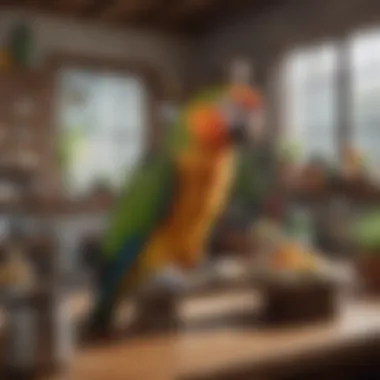
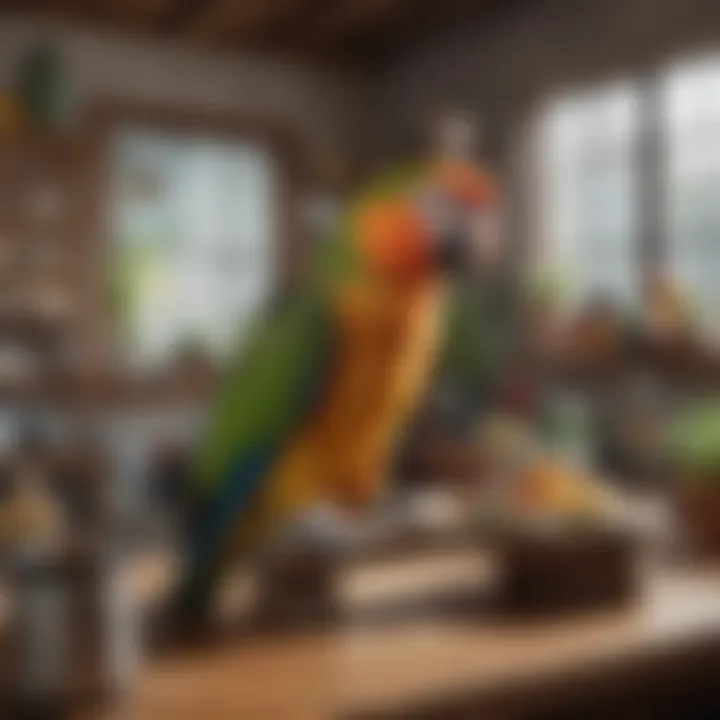
Watch for subtle behavioral changes, increased lethargy, or atypical droppings. These could indicate health problems. Clear communication with a vet helps to navigate any potential issues promptly.
Preventative Care and Vaccinations
Preventive measures such as vaccination tailored for specific bird species can bolster the bird's resistance to diseases. Ensuring your parrot is vaccinated should be part of regular healthcare guidance.
Mental and Emotional Well-being
A parrot's mental health is integral. Regular companionship, enrichment activities, and new experiences help minimize anxiety and prevent harmful behaviors. Regularly mix their environment with stimulating activities and safe toys.
Enriching Activities
Engagement activities contribute immensely to a parrot’s happiness. Enriching their lives with toys and stimulants evokes natural instincts.
Toys and Playtime Ideas
Offer a variety of toys to encourage exploration. Chewing, climbing, and problem-solving keeps them engaged. Rotate toys regularly to maintain interest.
Training and Tricks
Training should be fun, enriching, and promote bonding. Using positive reinforcement for teaching tricks greatly contributes to their mental stimulation.
Outdoor Activities and Interaction
With proper harness and leash use, take your parrot outside for fresh air. Daily outdoor time enhances mood and promotes exercise.
DIY Projects for Mental Stimulation
Creating custom toys from everyday items is a great way to provide enrichment. Using safe household materials, you can create works that intrigue your parrot’s creativity and sense.
Owning a parrot goes beyond mere companionship— it is an intricate balance of love, care, and great financial responsibility. Preparing ahead is essential for both you and your new feathered friend. Stay informed to form a meaningful relationship in your home.
Prologue to Parrot Ownership
Understanding if you are ready for a parrot involves several important considerations. This section serves as a foundational aspect of the article as it allows potential owners to grasp the responsibilities that come with parrot ownership and highlight the various appeals that these creatures hold.
Understanding the Appeal of Parrots
The allure of parrots is multifaceted. They are vibrant, intelligent creatures that form emotional bonds with their owners. Their ability to mimic human speech can also be fascinating, providing moments of amusement and companionship. Many people see parrots not just as pets, but as family members. Their social behavior and playful antics can bring a lot of joy into a home environment. Parrots are also known for their long lifespan, with many species living for decades. Owning a parrot can be a long-term commitment and having that emotional connection over years can be highly fulfilling.
However, their beauty and charm come along with demands that need to be met. Parrots require mental stimulation and social interaction. Unlike many more low-maintenance pets, they need regular interaction and enrichment to thrive into a well-adjusted and happy bird. Those looking to own a parrot must weigh the joyful experience of companionship against these responsibilities.
Assessing Your Readiness for a Parrot
Consider your lifestyle before making any abrupt decisions. Do you travel often? Is your home environment stable enough for a parrot? These are crucial questions to ponder. Parrots thrive in an interactive and stimulating environment. Assessing your personal schedule and availability is key to understanding if you can meet these demands of care.
Another significant aspect is financial readiness. Owning a parrot involves a myriad of ongoing costs, from specialized food to ongoing veterinary care. Do you have the budget set aside? Equal attention should be given to your living situation. Parrots can be loud and boisterous, which might not be suitable for everyone.
Here are some points to assess:
- Time commitment: Can you invest daily time?
- Financial budget: Do you have a continued budget for food, toys, and medical care?
- Living environment: Space and noise levels in your home decrease ho many species fit in to your life?
By examining these factors, you can determine if you are genuinely ready for the enriching journey that parrot ownership entails. Understanding your appeal and readiness will guide you as you explore further topics of cost and care.
Before obtaining a parrot, it’s important to grasp the lifestyle adjustments needed to ensure your parrot fits seamlessly and happily in your home.
The Initial Cost of Purchasing a Parrot
The initial cost of purchasing a parrot marks the first financial decision in the journey of parrot ownership. It is critical to understand the expenses associated with acquiring a feathered companion, as these costs can vary extensively. Factors such as species, age, and even the reputation of breeders play a role in determining the overall cost. This section aims to provide valuable insights into these imperative considerations, enhancing prospective owners’ judgment and preparedness before diving in.
Species-Specific Pricing
Parrots come in various species, each with unique attributes and varying price points. For instance, small parrots like parakeets typically cost less compared to larger species like macaws or Amazons. Some common costs may include:
- Budgerigar: Usually affordable, often priced between $10 and $50.
- Cockatiel: Ranges from $100 to $250.
- African Grey: Often priced between $1,000 and $3,000.
- Macaw: Higher upfront cost, typically between $2,000 and $5,000, depending on the species.
The selection largely depends on individual preference, and owners should consider parrot traits such as temperaments, lifespan, and personality before making their decision. The species chosen affects not just the initial cost but also ongoing care implications.
Factors Affecting Initial Cost
Age of the Parrot
The age of a parrot is significant in its cost structure. Younger parrots often come at a premium price, especially if hand-fed. Many prefer young birds because they can bond more easily and learn to speak or mimic at an early age. An infant parrot can cost more, but the bond developed over time may justify the expense. Additionally, young parrots may display fewer social issues compared to older ones. However, their care requires commitment and attention which may entail further expenditures down the line.
Health Status
Health status plays a pivotal role in initial pricing. Parrots that are clear from diseases generally command higher prices, as potential owners are assured of their well-being. Reputable breeders provide health guarantees that add to the cost but promise stable parrots that may lead to heartier birds. In contrast, birds with slight health considerations may be cheaper but they could lead to unexpected veterinary bills. Investing in a healthy parrot can lead to longevity, ensuring a companionship that endures.
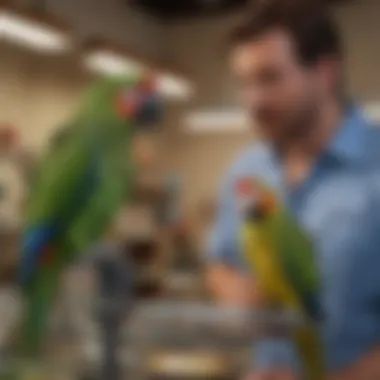
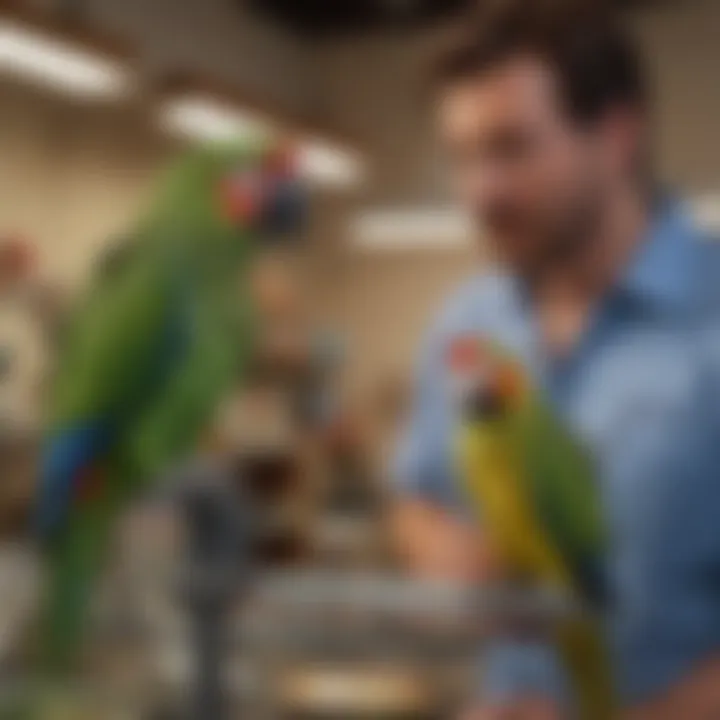
Breeder Reputation
Breeder reputation shapes initial costs significantly. A trustful and reputable breeder, who adheres to ethical practices, often charges higher than a casual seller. This primarily reflects the rigorous breeding practices, socialization of the birds, and proper health checks ensured by reputed breeders. Customers can sometimes be reassured of handling species that have been well cared for and nurtured in their early life stages.
In summary, being informed about the initial costs of purchasing a parrot can lead to informed and thoughtful decisions, steering aspiring bird parents into a favorable ownership experience.
Essential Setup Costs
When considering parrot ownership, understanding the essential setup costs is crucial. These initial investments lay the groundwork for a safe, comfortable, and enriching environment for your new companion. Without adequate preparation, you may face challenges affecting both the parrot's wellbeing and your satisfaction as a pet owner.
Cage and Habitat Requirements
A well-constructed cage is vital. It must be spacious enough to allow your parrot to move freely, stretch its wings, and socialize. Different species require different sizes. For instance, a larger macaw needs a sizable cage compared to a smaller budgerigar. Basic cages may range from two hundred to over a thousand dollars, depending on size and materials used.
Not to forget, the habitat should mimic a parrot's natural environment. This is where your choice of perches, climbing spaces, and even plants comes into play. The right accessories will provide enrichment, improving your parrot’s mental health. Budget for natural wood perches and safe, non-toxic toys.
Consider adding a play area outside the cage. This enhances engagement and reduces monotony, promoting physical activity. The setup could add another hundred to three hundred dollars to your expenses.
Toys and Enrichment Supplies
Parrots are intelligent creatures. They require stimulation to thrive. Toys play a significant role in your parrot’s social interactions and cognitive development. Chewing and shredding toys are essential for their beak health. These toys vary widely in price, typically ranging from ten to seventy dollars, depending on the size and complexity.
Consider rotating toys regularly. This prevents boredom and keeps your parrot mentally stimulated. Fixtures like ropes, swings, and activity centers provide safe options for play and exercise. Some parrot owners choose to craft their own toys, reducing costs while personalizing the play experience.
Regularly replacing damaged or worn toys can incur extra expense as well. Budget for approximately fifty dollars monthly.
Bedding and Cleaning Supplies
Maintaining a clean habitat is a must for any pet, including parrots. A proper bedding solution absorbs waste and controls odors. Materials can range from paper-based products to corn cob bedding, costing about ten to thirty dollars monthly.
Keeping your equipment clean ensures your parrot's health. You will need a variety of cleaning supplies, such as disinfectants, brushes, and sponges. Allocate about twenty to fifty dollars initially for these supplies, and more as replacement costs arise.
A recommendation is setting up a cleaning routine to ensure a hygienic environment and to prolong equipment life. Through adequate setup costs, you can provide a quality environment for your parrot, leading to healthier and happier companions.
Important: Invest early in the right supplies to avoid costly replacements and problematic behaviors due to insufficient habitat conditions.
Recurring Expenses of Parrot Ownership
Owning a parrot is not simply a one-time commitment; rather, it involves ongoing responsibilities that can impact a person's finances. Understanding recurrent expenses is crucial for prospective and current parrot owners. These costs not only include buying food and necessary supplies but also entail veterinary care and insurance. Recognizing these recurrent obligations up front allows one to budget wisely, ensuring that the parrot receives the care it deserves. Making provisions for these aspects is an integral step in providing a stable and healthy environment for a pet.
Feeding Your Parrot
Types of Food
Providing appropriate food for your parrot is crucial. Different species have unique dietary needs. Seeds, pellets, and formulated diets form the basis of proper nutrition. Seeds are a common choice; they are popular and readily available. However, they often lack certain nutrients essential for a parrot’s health. Pellets are more balanced and can be a beneficial mainstay since they contain what parrots require daily. A diverse diet ensures your bird remains healthy and vibrant. Thus, selecting quality food should be at the forefront of your budgeting plan.
Cost of Fresh Produce
In addition to pellets, fresh produce plays an important role. Fruits and vegetables can bring essential vitamins and minerals to your parrot’s diet. Common choices include leafy greens, carrots, and apples. While offering fresh produce, keep in mind that these items can come with varying costs based on season. They may be inexpensive in certain months but pricier in others. Nonetheless, the animal's well-being justifies the investment, as fresh produce has far greater benefits compared to processed options. Consider planning weekly shopping to maintain freshness, which contributes to flock health.
Routine Veterinary Care
Annual Check-ups
Routine veterinary care is a fundamental aspect of bird ownership. Annual check-ups help detect possible health issues early. During these examinations, vets assess general health, feathers, and any potential issues. They might recommend blood tests which can lead to an accurate diagnosis. Keeping this as a priority can reduce the risk of unexpected health crises. Owner often notices hens can be supportive purchasing particular health checks annually.
Emergency Situations
Although preventive care is vital, emergencies can arise unexpectedly. Having funds available for urgent care or treatment will help navigate these downturns, if they arise. Emergency situations can include injuries or sudden illnesses that need prompt attention. Costs for emergency vet visits can escalate quickly but avoiding treatment can worsen outcomes. Thus, acknowledge that an emergency fund should be part of your long-term financial strategy.
Insurance Costs for Your Parrot
Lastly, pet insurance can be an invaluable resource for owners. Insurance can cover various expenditures, from routine visits to unexpected emergencies. Pay attention to policy features to find coverage that suits your specific circumstances. Though costs vary, dedicating a part of your budget to this coverage might lessen out-of-pocket expenses. Just keep seasoned vet could recommending additional health checks regarding your particular claim portioned policy.
The Financial Commitment Beyond Basics
When considering parrot ownership, evaluating the financial commitment beyond the basic costs is crucial for prospective owners. While initial costs and recurring expenses form the foundation of the overall investment, understanding hidden expenses and situational variables plays a significant role. These factors can impact your long-term experience as a parrot parent.
It is important to emphasize that owning a parrot is more than just feeding and basic care. Every bird has unique needs and circumstances that can lead to variable costs. For instance, travel and boarding expenses can quickly add up if you are away often. Ensuring your parrot has the best care includes looking at these additional obligations.
Another layer to consider is unexpected costs. Just like any animal, pets can require unplanned care. Being prepared for these situations will ensure your budget accommodates more than what seems evident at first. Overall, the costs of managing these financial aspects can lead owners to reconsider their long-term roles, ultimately guiding their decisions towards the right commitments for their life and lifestyle.
Travel and Boarding Expenses
Traveling poses unique challenges for parrot owners. If you anticipate travel, boardings methods for your parrot require thought and preparation. Depending on your destination and duration, ensuring proper care can become an into significant expense.
Several options exist when you need to board your bird. Dedicated pet boarding facilities that specialize in avian care are available, but they tend to be more expensive. Basic costs could range anywhere from $15 to $50 a day or more. In some cases, friends or family that can look after your parrot may work in your favor, but this depends on their knowledge and willingness to care for your pet.
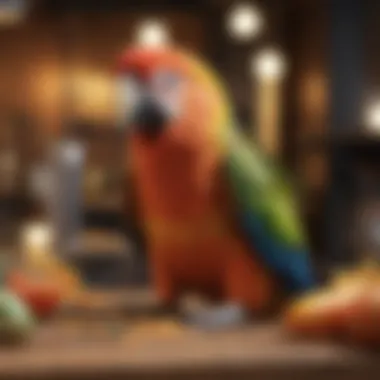
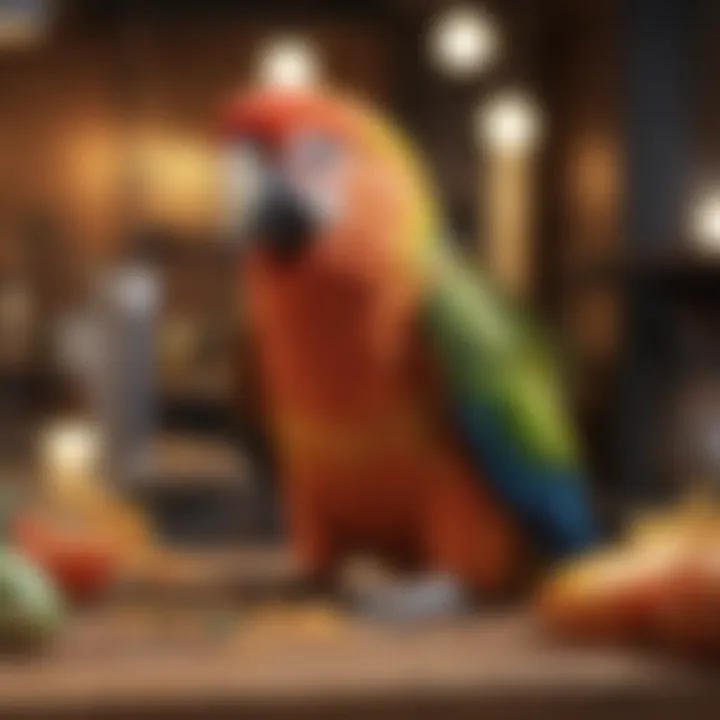
When choosing a boarding situation:
- Assess the boarding facility's experience with birds.
- Ensure they understand the specific requirements of your parrot’s species.
- Calculate the total expense involved, including breakfast, meals, and any specialized attention your parrot might need for its unique wants.
Overall, preparing and apraising these travel costs will help to ensure a smooth experience and safeguard your parrot's well-being during separated duty.
Unexpected Costs and Your Budget
Unexpected costs emerge regularly in pet ownership. Parrot emergencies can develop due to health problems, misbehavior, or accidents. Have plans in place to address any unforeseen types of situations.
Here are events to consider when budgeting for unexpected events:
- Veterinary visits aside from standard check-ups
- Supplementation or special diet requirements
- Supply deterioration requiring immediate replenishment
- Behavioral corrections or behavioral consultants expense expertise
Owning pets challenges standard budgeting along the path perfectly aligned with their care needs. Allocating contingency funds is wise, making it easier to meet those urgent parrot needs down the road. Additionally, figuring about the possibility of insurance could ease hefty financial strain when emergencies strike.
Assessing the Return on Investment
Assessing the return on investment (ROI) involved in parrot ownership is crucial for potential bird parents. It's not just about the monetary costs, but also the intrinsic value derived from companionship and emotional connectivity. Understanding what one gains – both financially and socially – plays a vital role in this decision.
Quality of Life for Your Parrot
The quality of life for your parrot you want to add is a key factor when calculating ROI. Parrots can live up to 50 years in captivity, necessitating thorough care and proper environment. Investment in their habitat, nutrition, and social interaction significantly influences their well-being. A well-designed cage, varied diet, and mental enrichment activities contribute to a parrot's happiness.
Invest minimally in cheap supplies as this can affect your parrot adversely. Instead, choose a robust cage and toys aligning with their behavioral and psychological needs. Healthy, content parrots exhibit better social behaviors, which enrich the ownership experience for you, which enhances the lifetime value.
Maintaining a high quality of life indirectly comes back in the form of a well-behaved and healthy bird. Parrots offer companionship that brings emotional support to owners, creating profound fulfillment.
Emotional and Social Benefits of Parrot Ownership
The emotional and social benefits associated with parrot ownership cannot be overstated. Strong emotional connections form over time. Interacting with a parrot provides a unique sense of connection that may not be paralleled with other pets. Their playful antics and intelligent mimicking promote engagement, forming bonds that can facilitate stress relief and promote well-being.
Studies show that pet ownership correlates with improved mental health outcomes. Specifically, the companionship of a parrot can contribute to feelings of happiness and reduce feelings of loneliness. Setting a routine around your parrot's care can enrich both the owner’s and bird’s life through daily interaction and mutual understanding.
Investing in related resources – such as learning about bird behavior or joining a local parrot society – can further expand your social circle. Networking with other bird owners fosters a community, enhancing social experience and knowledge about their care.
In summary, weighing the investment into quality of life and emotional benefits acknowledges the profound impact parrot companionship delivers. Consider these aspects seriously, as they predictably make an enriching, holistic difference in the decision to bring a parrot into your home.
Making Informed Decisions
When considering the addition of a parrot to your life, making informed decisions is crucial. The responsibilities tied to parrot ownership are substantial. Each individual should enter into this commitment with a thorough understanding of not just the initial cost but also the ongoing financial implications.
Evaluating Your Financial Situation
Assessing your financial situation is a fundamental step. It involves embracing not only the initial buying price, which can vary based on species and age, but also the regular costs associated with maintenance. Potential conumers should take into account:
- Monthly food expenses: Food for parrots can range from seed mixes to high-quality pellets and additional fresh produce.
- Veterinary care: Regular check-ups and vaccinations are necessary and, depending on the location, may be costly.
- Supplies: From toys to cages, this includes quantities you need over time.
Take a close look at your budget. Consider what you can sustainably allocate toward your new companion without compromising your other financial obligations. This includes savings for emergencies, unexpected costs, or any medical procedures your parrot may need.
Long-term Commitment Assessment
A parrot is not just a pet; it is a lifelong commitment. This assessment tackles the long-term responsibilities, challenging potential owners to think beyond initial acquisition costs. A suitable question to ask might be: Can you commit for 20 to 50 years?
Additional factors to consider include:
- Time commitment: Parrots require interaction and social engagement daily.
- Adaptability: Can your lifestyle accommodate shifts, like moving or changes in household dynamics?
- Age of the bird: Younger birds may have needier requirements than older ones.
Adopting or buying a parrot entails nurturing more than just a financial investment; it also requires emotional dedication and flexibility in life circumstances. Understanding this aspect can significantly affect your overall experience as a parrot owner.
This involves looking deeper into your life and future plans, ensuring a decision that resonates.
Being proactive in gathering information can indeed shape your trajectory as a pet parent, assisting you in navigating the complexities and joys of being a parrot owner.
Finale: Weighing Costs and Benefits
Owning a parrot comes with unique costs and benefits that merit thorough consideration. As a prospective parrot owner, understanding these elements can heavily influence your decision. The joys of relationship with a parrot are numerous, but they are accompanied by responsibilities that cannot be ignored. Analyzing these aspects is crucial for ensuring that both you and your parrot thrive together.
Deciding to bring a parrot into your home means accepting a complex emotional bond. These birds exhibit personality traits that often read like those of a small child. Their intelligence requires you to engage with them beyond just the physical care needed. Social interaction is vital, and the time you dedicate towards nurturing this bond shapes their well-being. Is the joy your parrot brings outweighing the cost of toys, food, and care?
Additionally, consider hidden expenses such as veterinary visits and potential boarding costs. Understanding these financial commitments will promote a holistic view of your venture into parrot ownership. Some owners may dismiss these as trivial; however, they can accumulate quickly and set you back financially.
“Think of owning a parrot not just as feeding and housing them, but as creating an emotional partnership.”
In comprehending the full spectrum of both tangible and intangible costs, it helps to make informed choices long-term. Evaluating your preparedness and willingness to address such responsibilities could lead during the lifespan of around 20 to 50 years, on average for various parrot species. Cost assessment is therefore both financial and emotional, enhancing both your life and that of your parrot.
The Joys and Responsibilities of Parrot Care
Caring for a parrot is a dual-edged experience—it offers substantial rewards and significant responsibilities. On one hand, these birds bring an abundance of joy and companionship. The bonding experience can be profound, as parrots recognize their owners and often show affection through various behaviors. Their impressive vocal abilities are a source of entertainment.
Managing a parrot, however, is not straightforward. This demands attention to diet, health, and environment. Here are some key responsibilities:
- Nutritional Needs: Ensuring your parrot has a balanced diet is critically important. Parrots are not just pet birds; they need specific nutrients to maintain health and energy levels.
- Socialization: Parrots are social creatures. They flourish through interaction with their human companions and can develop behavioral issues if they feel neglected.
- Health Care: Routine veterinary care is non-negotiable for identifying issues before they become significant problems. Investing in preventative measures can drastically reduce long-term expenses.
- Enrichment: Bored parrot can exhibit destructive behavior. It is your duty to provide adequate stimulation through toys and social activities.
Taking all of these costs and responsibilities together, you should evaluate honestly whether you are ready to accept what it truly means to bring a parrot into your life. You are not just acquiring a pet; you are committing to a long-term relationship requiring care and empathy.















